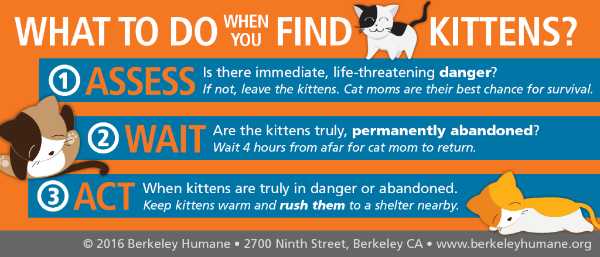Many of us want to help lost, abandoned, or feral animals when we find them in the streets. In the spring, these animals are often litters of kittens in a phenomenon known as Kitten Season. They can be just days or weeks old and seem so helpless if you have just stumbled upon them. So, what should you do!?
ASSESS
First and most importantly, assess the situation calmly. Look around the area. Is there immediate, life-threatening danger to the kittens? If not, leave the kittens alone. Momma is most likely nearby searching for food and will return soon to nurse her babies. The best chance for survival is for those kittens to be cared for by their mother.
WAIT
If you can, observe the kittens from afar. The kittens are most likely not permanently abandoned by their mother. Wait at least 4 hours – from afar – for momma cat to return.
ACT
If you have assessed and waited then determined that the kittens have truly been abandoned, then you can act. Gather the kittens in a box and keep them warm with a towel or blanket. Contact us online or call us at (510) 845-7735 so we can help assess the situation, or contact your local shelter.
If you have assessed and waited then determined that the kittens and their mother are in a dangerous place or situation, then do your best to safely gather the kittens AND their mother. It is important that the family stay together so she can continue to care for her kittens and later be spayed.
If you are uncomfortable attempting to handle the family yourself, there are many Trap & Release (TNR) organizations and volunteers in the Bay Area. TNRs humanely trap adult cats and get them spayed or neutered, then release them back to where they were picked up. This is part of an ongoing effort to reduce the feral cat population. A momma cat can become pregnant again after just 8-10 weeks after giving birth!
Keeping animals safe is Berkeley Humane’s top priority. This information is a basic guide, please check your county’s Animal Control guidelines.












